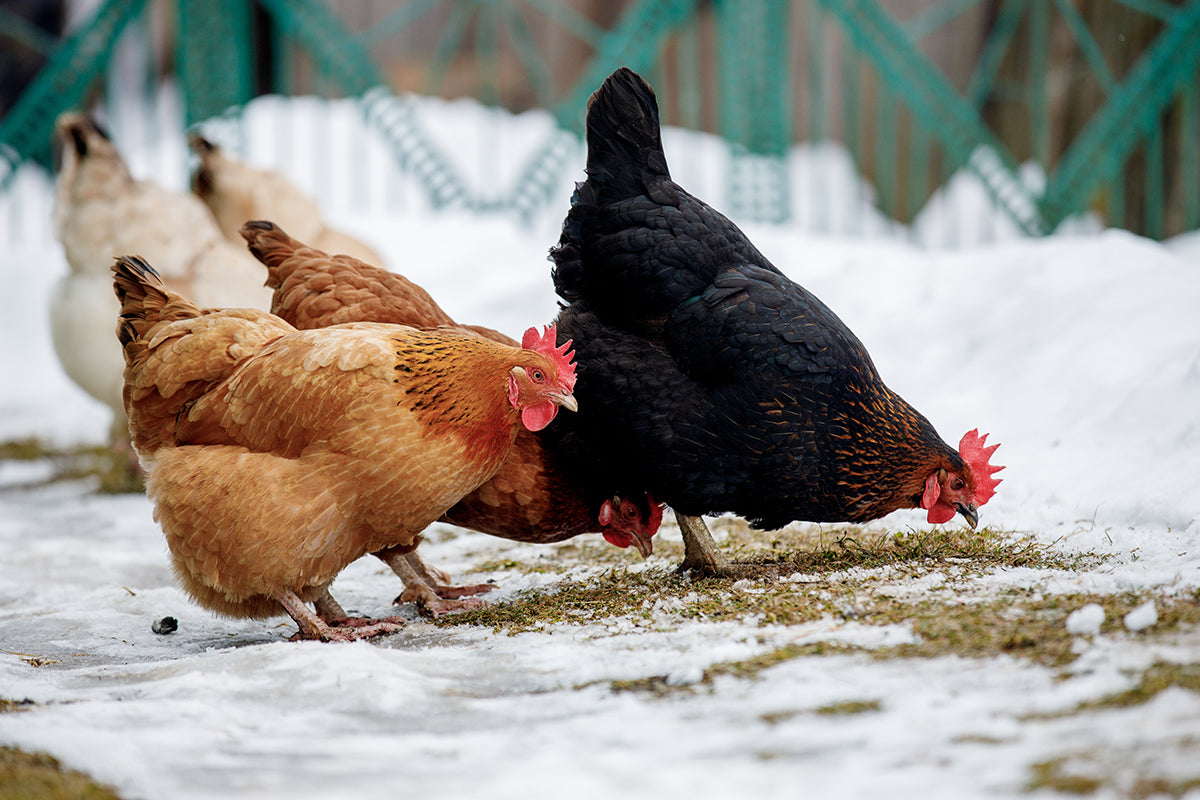
Best Cold-Hardy Chicken Breeds
If you live in a cool climate that experiences snowy, frosty winters and want fresh eggs year-round, choose cold-hardy chicken breeds for your hen house. In this article, we'll look at chicken breeds that adapt well to cold weather and how you can help make cold winters more bearable for your egg-laying, feathered friends.

22 Best Chickens for Laying Eggs in Winter
Whether you're just getting into a pet chicken hobby or planning to expand your brood, consider these chicken breeds for cold winters. They are best for winter weather because they have small combs and wattles less susceptible to frostbite and heavier bodies to sustain them better in cold conditions than other chicken breeds.
- Ameraucanas
- Ancona
- Black Australorp
- Black Giant
- Brahma
- Buff Orpington
- Cochins
- Columbian Wyandotte
- Delaware
- Dominique
- Easter Eggers
- Frost White Legbars
- Golden Buff
- Green Queens
- Lakeside Eggers
- Langshan
- New Hampshire
- Olive Eggers
- Plymouth Rocks
- Rhode Island Red
- Speckled Sussex
While these laying hens are cold-hardy, they still require proper accommodations to stay warm and be productive egg layers during winter. Here's what you can do to keep your chickens happy.
Winterize Your Chicken Coop
All chickens require a safe, cozy home in the winter. During colder weather, you want to ensure your flock has a place to warm up, shelter from the elements and access to free-flowing water.
Chickens require supplemental heat sources when the interior temperature of their coop drops below 35 degrees Fahrenheit. When laying hens get too chilly, they huddle together, fluff up their feathers and slow or cease egg production.
To get the best results from your layers, collect the eggs soon after they are laid to avoid cracking and freezing. With a little mindful observation, you'll quickly learn what time of day your hens tend to produce.
Warm the Space
You can make their space cozier by sealing drafty windows and doors, adding proper rooftop ventilation and accessorizing the coop with extra bedding and warming devices.
Treat your hens to a K&H Thermo-Chicken Heated Pad. Plug it in, and your feathered friends can walk, stand or sit on the warm pad. Its internal thermostat regulates the heat output so your pets enjoy the perfect temperature. To keep the pad clean, use a damp cloth or soapy sponge.
Another nice way to offer extra warmth to your pet hens is to install a few K&H Thermo-Chicken Perches. These heated roosts, made of tough plastic, are scratch and bite-resistant. The warmth on their feet lowers stress and keeps your pets cozy.
Prepare for Hatchlings
Are you letting a few of your hens hatch chicks over the winter? Prepare to keep the hatchlings warm with the K&H Thermo-Poultry Brooder. This elevated heater (available in two sizes) allows chicks to gather under the warming device and snuggle up to it, much like they would a mother hen.
As the chicks grow and become too tall to gather under the brooder, install the K&H Thermo-Peep Heated Pad. The chicks can walk, stand or sit on the flat pad to get warm. The internal thermostat heats to the chicks' body temperatures when on the pad, so they will never get too hot.
Offer Unfrozen Drinking Water
All pets need access to fresh, flowing water 24/7. The trick in colder climates is to keep drinking water from freezing!
The K&H Poultry Waterer heats 2.5 gallons of water, so your pets have continual access to unfrozen drinking water during cold weather. This waterer can also be used without heat during the spring and summer. The design features a no-roost top to keep the water tray cleaner and a spill-proof tank cap to make refills a breeze.
If you already have a waterer but want to winterize it, try the K&H Universal Waterer Deicer. Simply place your waterer on top of the heated disk to keep winter water thawed. This deicer works not only for chicken watering stations but also beneath water troughs for other small farm friends, including goats, cats and ducks.
Winter Chicken-Keeping Is Possible
By selecting cold-hardy chicken breeds, you can keep your hobby going through the winter. Create a cozy hen house outfitted with warming pads, perches and fresh drinking water, and you're sure to have some happy cluckers this winter!
Learn more about pet chicken care in "Do Chickens Like Rain or Getting Wet?" and "9 Types of Chicken Feed Explained."



